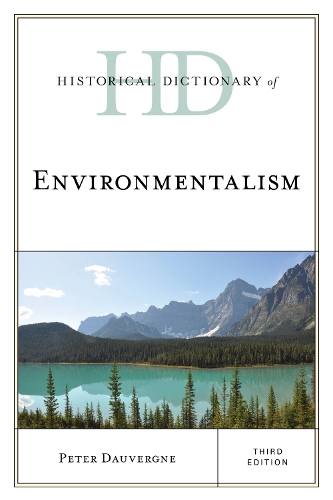
Historical Dictionary of Environmentalism
(Hardback, Third Edition)
Available Formats
Hardback, Third Edition
Published: 26th March 2024
Hardback, Second Edition
Published: 9th September 2016
Publishing Details
Historical Dictionary of Environmentalism
By (Author) Peter Dauvergne
Bloomsbury Publishing PLC
Rowman & Littlefield Publishers
26th March 2024
Third Edition
United States
Classifications
General
Non Fiction
Environmental science, engineering and technology
Development economics and emerging economies
Sustainability
Subject dictionaries
333.7203
Physical Properties
Hardback
376
Width 159mm, Height 237mm, Spine 26mm
671g
Description
Historical Dictionary and Environmentalism, Third Edition provides a balanced and wide-ranging overview of the most important events, issues, organizations, ideas, and people shaping the direction of environmentalism worldwide. This book is global in scope, covering a large range of perspectives and countries with a focus on the period since 1960.
This book contains a chronology, an introduction, and an extensive bibliography. The dictionary section has more than 400 cross-referenced entries on organizations, people, issues, events, and countries shaping environmentalism. This book is an excellent resource for students, researchers, and anyone wanting to know more about environmentalism.
Reviews
This book seeks to be an all-in-one reference source, combining a dictionary with a chronology, bibliography, and brief thematic introduction. Dauvergne emphasizes international topics but also incorporates entries for individual countries, covering developments from the seventeenth century to the present. Types of entries include key concepts, major events, famous persons, political milestones, multilateral treaties, and nongovernmental organizations. Overall, politics is the focus more than science, religion, ethics, or philosophy, though each of these areas receives some attention, especially in the comprehensive bibliography. As a new third edition, the book also tends toward a recency bias; Standing Rock Protests has an entry, for example, but there is none for bison. Similarly, a section of illustrations highlights contemporary issues rather than historically significant people and places. However, Dauvergnes justification that environmentalism has become a predominant global issue in more recent years is well taken. With its concise length, plentiful entries related to the United States, and extensive coverage of international agreements often in the news, this book may impress readers as more up-to-date and approachable than larger-scale environmental reference works such as the Berkshire Encyclopedia of Sustainability (CH, May'10, 47-4782). Recommended. Lower- and upper-division undergraduates, general readers. * Choice Reviews *
Author Bio
Peter Dauvergne is a professor of international relations at the University of British Columbia. Specializing in the politics of global environmental politics, his recent books include Identified, Tracked, and Profiled: The Politics of Resisting Facial Recognition Technology (2022), AI in the Wild: Sustainability in the Age of Artificial Intelligence (2020), Will Big Business Destroy Our Planet (2018), and Environmentalism of the Rich (2016).
